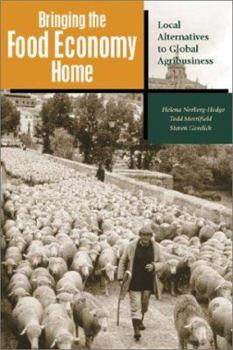Bring Food Economy Home PB
Select Format
Select Condition 
Book Overview
If the many social, environmental and economic crises facing the planet are to be resolved, a good place to start is to rebuild local food economies. Food is something everyone, everywhere, needs... This description may be from another edition of this product.
Format:Paperback
Language:English
ISBN:1565491467
ISBN13:9781565491465
Release Date:June 2002
Publisher:Kumarian Press
Length:150 Pages
Weight:2.70 lbs.
Dimensions:0.4" x 6.1" x 9.0"
Customer Reviews
1 rating
From local to global to local
Published by Thriftbooks.com User , 20 years ago
Calculating the true cost of getting your family's typical dinner on the table would reveal a shocking price! In addition to produce cost itself, you would have to include the delivery charges for each meal component: from the producer via long distance shipping, packaging, storage, and distribution to you via your local supermarket. The authors suggest that product travel distance in reaching our table should be calculated in 'food miles'. The further the distance - the higher the price . At least that's what it should logically be. However, as consumers, most of us rarely pay the full cost of any food item. If we did, we would appreciate more readily how the global food system has turned food production on its head. Thus claim the authors of this concise and illuminating analysis of globalization of the agribusiness and its impacts on our well-being. While this slim volume might appear otherwise, the study is packed with useful information and concrete data. It explains why we are facing major problems in the food economy around the world. In developing and industrialized countries farmers are abandoning their land to large-scale cash-crop agribusiness or big corporations. The push for crop monocultures is contributing to land degradation and is skewing food supplies. The authors demystify the notion that a globalized food system is more efficient and economic and question the logic of its processes. For example, in recent years the UK has been importing about as much milk as it has exported! The only beneficiaries of this artificial trade balance, they argue, are the transport businesses and the financial speculators. As tax payers we subsidize the transportation business by allowing governments to subsidize the development of big agriculture to the detriment of local farmers everywhere. The authors encourage the reader to examine these issues and outline what we can do as consumers and citizens, to reverse current trends. Examples and case studies are interleafed with tables and statistics illustrating the underlying argument of the authors: to restore local food production and closely link it to the consumer. In this well-structured and easily followed study, the authors examine global food issues from all possible angles: food and health, food and economy, food and community; food and marketing ecologies and (local) food security. In addition, the authors expose the serious environmental impacts of large-scale monoculture farming and the unnecessary transport of food shipped across the globe or from one end of the country to the other (in the US). For example, US cookies are exported to Denmark while Danish cookies are exported to the US! Why not, the authors argue, just swap recipes at minimal cost? In each chapter the implications of globalizing the food sector are summarized, critiqued and contrasted with working alternatives. For example. initiatives of community-based agriculture or consumer-coops are introduc





